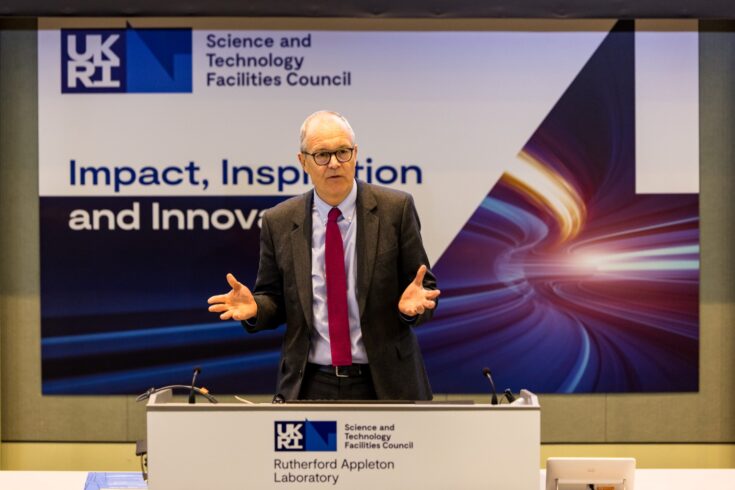The event brought together over 70 elite investors, entrepreneurs and innovation stakeholders at STFC’s Rutherford Appleton Laboratory, Harwell Campus.
It connected them with startups in quantum computing, space technology and cleantech sectors.
These are sectors where the UK aims to establish global leadership.
The event featured a keynote address from Lord Vallance, UK Minister for Science, Innovation and Technology, alongside presentations from some of the most promising deep tech startups.
Help solve challenges that society faces
Lord Vallance, UK Minister for Science, Innovation and Technology, championed STFC’s approach to turning scientific breakthroughs into commercial success:
It’s absolutely crucial that the great science we do in the UK translates not only into knowledge but also into economic benefit and into products that will enhance lives right across the UK.
At Harwell and the STFC, there’s a strong track record of not only doing world-class science in a number of deep tech areas but also in creating new companies.
This is what we need to do right the way across our system, to make sure that ideas are taken into companies, into the potential for those companies to scale and grow, and to deliver products that benefit society and helps solve the challenges that we know society faces.
Pioneering companies showcase technologies
Industry pioneers shared their success stories, including:
- Mark Thompson of PsiQuantum, which recently established its £9 million research and development centre at STFC’s Daresbury Laboratory
- Rafel Jorda Siquier of Open Cosmos
Representatives from the National Quantum Computing Centre and Rosalind Franklin Institute highlighted cutting-edge facilities available to innovative businesses.
The event featured lightning pitches from high-potential startups incubated within the Quantum Business Incubation Centre and Innovation Technology Access Centre, including:
- Ionech
- Oxford Dynamics
- Quantopticon
- Spottitt
An investor panel featuring Anne Crean of Institute of Physics discussed solutions to the funding gap for deep tech physics, with representatives from Albion, UKi2S and Healthcare Innovation exploring investment trends.
Leadership perspectives
Michele Dougherty, Executive Chair for STFC, explained the unique ecosystem that drives this success:
The science STFC supports through grants and facilities helps understand how the universe works.
This process leads to new discoveries and opens new areas for research.
We also develop advanced technologies in our world-leading facilities and collaborate with UK industry to address real-world challenges.
That’s why Harwell is vital – it provides a critical mass of experts for collaboration, which is why we’re focused on improving the campus and increasing expert involvement.
Paul Vernon, Executive Director of Business and Innovation and Director of Daresbury Laboratory for STFC, highlighted the practical impact of STFC’s infrastructure:
STFC designs, builds and operates some of the world’s most advanced scientific infrastructure – not just to enable discovery, but to drive innovation and deliver impact.
Our incubation programmes help UK-based startups tackle complex global challenges.
By combining deep technical expertise with targeted support, we de-risk early-stage innovation and help deep tech ventures succeed faster.
Exceptional success metrics
STFC’s business incubation centres have supported over 150 UK startups since 2011.
Property valuations for Harwell as of 2024 reached £414 million, supported by significant development projects to accommodate fast-growing companies.
STFC’s business incubation portfolio demonstrates:
- 95% company survival rate
- 20 times return on investment
- £650 million in enterprise value created
- 70% of product and service sales as exports
For more information about STFC’s business incubation and innovation programmes:

